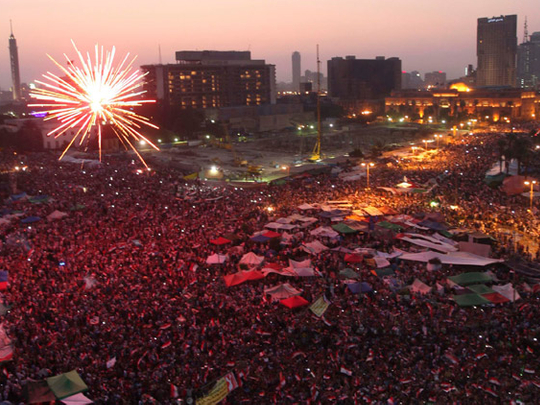
For a few hours on Sunday, the entire Arab world held its breath as Egypt’s election commission chief delivered his preamble for the declaration of the winner of the presidential election. Until the moment Farouq Sultan announced Mohammad Mursi the winner, the name of the president-elect was a guessing game. And that by itself is an Egyptian victory.
Under the old regime, the winner would have been known even before voters cast their ballots. So has the largest Arab country ushered in an era of democracy? Not quite there yet.
Democracies are not born overnight. And of course this was not a fair and transparent election. Democratic systems are built brick by brick, if they are to last — just like the great pyramids.
Overthrowing a corrupt and oppressive regime doesn’t mean democracy will prevail the day after. We all know the story of Iraq post US invasion of 2003. Iraq’s tragic story shows us that democracy is not a political system. It is much more. It is probably the evolution of a system that will enshrine its citizens’ individual freedoms — social, religious and economic. Here lies Egypt’s challenge.
The president-elect comes from an Islamist background; specifically from the Muslim Brotherhood group which had for decades been banned by the Hosni Mubarak regime. This background makes people uneasy. It takes a lot of convincing to alley the fears of the Egypt we know — moderate, open-minded and globalised — that an Islamist leader and government may try to impose a blinkered vision, the Muslim Brotherhood vision, on a great 7,000-year-old civilisation.
Those fears are legitimate. Shortly after winning the majority of seats in the parliament, Islamist lawmakers tried to ban movies and concerts and discussed the possibility of restricting the popular night spots in Cairo and Alexandria. A leading comedian, known for his anti-Islamic views and plays, was sentenced to three months in prison.
Mursi on Sunday night tried very hard to alley these fears. He promised to be “a president for all Egyptians”. Earlier he said his goal was to “create a civil state; not a religious state, not a military state”. Great. But Egyptians look for deeds not just words. It is reported that he promised the leaders of other parties that one of his deputies “will be a Copt”, from the Christian minority. It doesn’t matter.
Mursi needs to do more. His party needs to do more. It is obvious that he will have a tough time dealing with the powerful Supreme Council of the Armed Forces, but he should think of a long-term political process that will pave the way for a real democracy in Egypt — an Egypt that will lead the Arab world into a new era of political empowerment.
Egypt influenced the Arab world for centuries. We are all followers of the great Egyptian politicians, scholars and artists. As the old Arab saying goes: “Egypt writes, Lebanon prints and the rest of the Arabs read”. Its role, however, diminished in the past few decades as its subsequent governments looked inward, isolating Egyptians from the rest of the Arab world, thus allowing other regional powers, such as Turkey and Iran, to try to fill thae void. They could not. They never could. Egypt remains the beating heart of the Arab world. We may disagree with its decisions and the direction of its politics, but at the end of the day, we look up to Cairo for validation.
Today, more than ever, a turbulent Arab world needs Egypt’s leadership. But Egypt has to reconcile with itself first. Mursi must remember that and honour his promise of leading “an all-inclusive” process.








